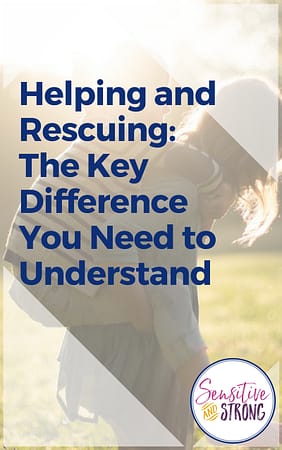Helping and Rescuing: The Key Difference You Need to Understand
“Growing Sensitive & Strong” is the life-changing program that moves you from “What’s wrong with me?” to comfortable and confident in who God made you as a Highly Sensitive Person.
To be the first to know when Early Bird Registration for our summer session begins, you can add yourself to the Waiting List right here.
“What kind of teacher refuses to help a student?”
The final deadline for second semester assignments has come and gone.
This student has asked, “What can I do to raise my grade to passing?” and been told the truth: “Nothing.”
They’ve argued and begged, to no avail.
So, they resort to shame, hurling words as a weapon.
“What kind of teacher refuses to help a student?”
Helping vs. Rescuing
After this incident, I asked my Facebook friends, “What’s the difference between ‘helping’ and ‘rescuing’?”
- Helping is providing someone with the tools to succeed. Rescuing is doing it all for them.
- Rescuing doesn’t allow for them to grow, learn boundaries, or consequences for their actions.
- To me, helping means coming alongside and providing guidance–like teaching a child how to ride a bike. Rescuing looks like you getting on the bike and riding it for them.
- Helping means letting them fail so they can learn. It’s hard. If you continually rescue they will never learn to be independent and have the confidence or the courage to move forward.
- Helping = teaching skills they can use next time, Rescuing = taking the whole situation on my own shoulders instead of allowing them to learn and grow.
- Rescuing would be giving a kid gas $ when they are running low. Helping would be offering them jobs to earn more gas $.
- Helping is assisting someone to do something for themselves. Rescuing is saving someone from the consequences of their actions or the actions of another.
- Helping: coming alongside another to give advice, support or resources during a difficult time. Rescuing: taking ownership of another’s problem and making it my mission to fix it/them. The term rescuing sounds unhealthy, but I think sometimes we are asked to be for a short time (thinking of trafficking, abuse, etc) and at some point we need to transfer ownership/dignity back to the person who it belongs.
- Helping empowers. Rescuing saves.
The student who asked, “What kind of teacher refuses to help a student?” used the word help.
But what they actually wanted was rescue.
Hope for the Help-Avoidant
I used to be a lot like this student.
I waited far too long to ask for help.
Most of my childhood role models rarely asked for help. When they did, it was only in the most dire of circumstances.
So I spent my life obeying a bad rule that goes like this: “The only time you can ask for help is when you’re in crisis.”
By the time I asked for help, it was usually too late for anything other than rescue.
Timing is the key difference.
Finding Help
After my students finish their final exam, I tell them that their graduation gifts will arrive later than usual.
And that I am attaching a condition to their gift: When they arrive on their college campus this fall, I want them to do three things.
- First, locate the learning center and get set up with a writing tutor.
- Second, find the counseling center and make an appointment.
- Then, send me a selfie in front of either building. I’ll text back their gift certificate within the hour.
“Of course,” I admit, “your selfie won’t prove that you’ve gone inside or made an appointment. But it will show that you know where to go for help.”
“Ask for help early. Ask for help often,” I urge them.
“Build your support team before you need it.”
Build Your Support Team Before You Need It
My purpose today isn’t to shame anyone currently in need of rescue.
If you’re there, you’re there. I’ve been there, too. I’ll be there again.
My goal is to offer encouragement:
You don’t have to wait until a crisis to ask for help.
And permission:
You can ask early.
You can ask often.
You can build your support team before you need it.





Really helpful article Cheri! Your example of the student wanting to be rescued was brilliant. That kind of manipulation can make a hard working teacher weary but I really appreciate the compassionate way you responded without actually rescuing! I was really blessed by this article. Thank you and God bless
This post struck a chord with me. But I tend to rescue others, when helping them would be far better for them, and for me. And they don’t even have to ask me to do it, just appear needful.
Rescuers who do it over and over tend to resent those who they rescue.
Any thoughts on how to step back and not rescue? As a nurse and a wife and stepmom of 3 years, I really need it.
I think the confusion with our children between help and rescue comes naturally. They are born helpless and are dependent on us for their survival but little by little that control/power must shift as they become capable of doing things and making decisions even if the decisions may be different from the ones we’d make. The act of making them is key to leaning and growth.
Awesome, wise and profound post, Cheri!
Thank you and may God bless you ♡
What a great article! I have the same philosophy as a substitute teacher. I know I’m only there for one day, or so, at a time, but I still want to teach the kids how to help themselves rather than just depend on me to give them the answers. I’ve always done the same things with my kids too. I really like your idea of having them send you the picture before sending their gift certificate. Having 1 kid in college and 1 there in a couple of months, I know how important those places are. Thanks for being a teacher who helps her students.
When my daughter was in HS, she cratered both academically and emotionally because she didn’t know how to ask or receive help and I didn’t know the difference between help and rescue. A wonderful counselor helped us learn how to navigate her owning her actions and consequences and private tutoring got her back on track. For the first four semesters she was at college, there was a least one course each semester where after attending the first class, she walked across to the academic center and got herself a tutor.